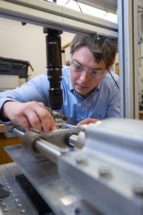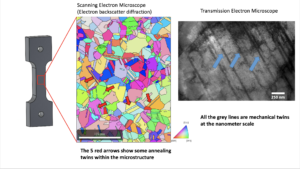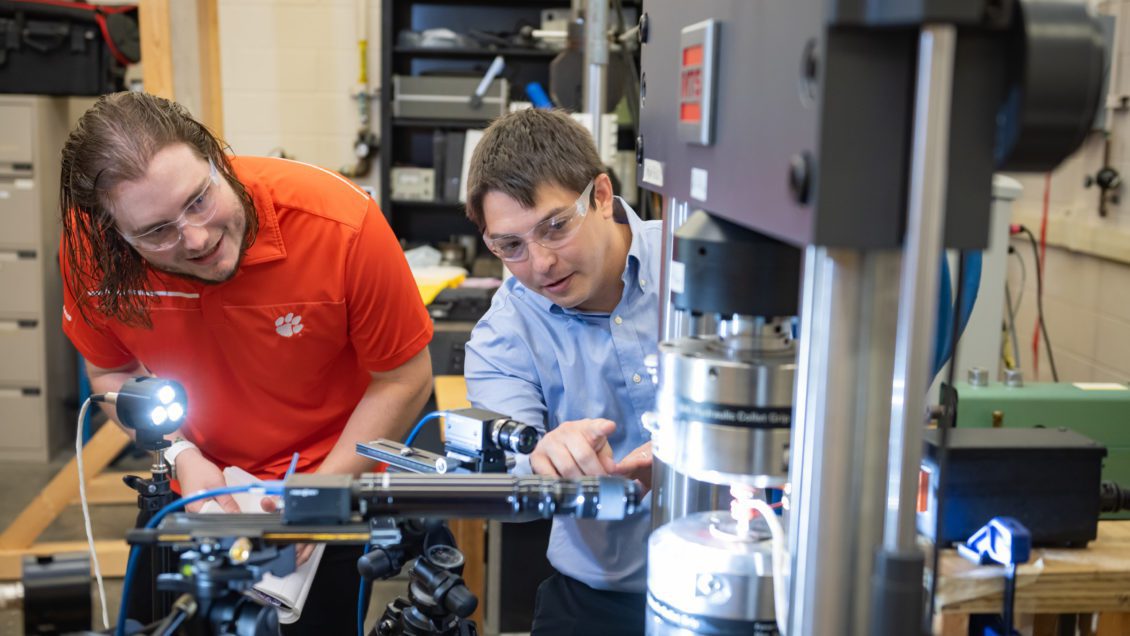Garrett Pataky of Clemson University and his students will be taking an up-close look at what happens when metal cracks, as they launch new research that could lead to longer-lasting metal in everything from bridges to cars.
The problem at the heart of the research is fatigue, which is what happens to metal when it is subject to repeated stress, also called loading. The Pataky team will intentionally crack sample pieces of an aluminum-copper alloy and then examine the crack interactions with the microscopic grains and boundaries that make up their microstructures.

“The point of the project is to look at the microstructure and see how we can improve it for fatigue resistance without making a new material, which is costly and takes a lot of time,” Pataky said.
Pataky, an assistant professor of mechanical engineering, has received a $555,634 CAREER award from the National Science Foundation to support the project.
Atul Kelkar, chair of the Department of Mechanical Engineering, offered Pataky his congratulations and said he is well positioned to lead the project.
“Dr. Pataky has deep experience in researching metals and a passion for teaching what he has learned to others, making him a perfect fit for the award,” Kelkar said. “CAREER awards are often a sign of future success, and he is highly deserving.”
Pataky and his team will use aluminum-copper as a model for their experiments, but the results are expected to apply to more advanced metals, such as nickel-based superalloys, stainless steels and potentially types of metal that have not yet been invented.
The research will be of special interest to metal developers and to engineers who design things that use metal, such as cars and airplanes. Stronger metals would allow engineers to be more aggressive in their designs, helping create vehicles that are lighter and more fuel efficient, Pataky said.

When the research starts, the team will use a type of lab equipment called a loadframe to stretch out dog-bone-shaped samples.
While it won’t be visible to the naked eye, something special will be happening at the microscopic level. Stretching the metal will create “twin boundaries” within grains in the metal.
Researchers know twin boundaries make the metal stronger and more ductile, but their effect on crack growth remains unclear. The Pataky team’s hypothesis is that the twin boundaries will reduce the rate of growth of cracks in metal caused by fatigue.
To learn more, the team will put the stretched samples in a scanning-electron microscope and use backscattering diffraction to map the metal’s microstructure, including the location of twin boundaries. Then the sample will go back into the loadframe where it will be repeatedly pulled and released until the metal cracks and the crack has a chance to grow, while a camera takes photos at the mesoscale.
It often takes millions of pulls-and-releases over several days for a crack to form.
“That crack will start interacting with our microstructure and twin boundaries, letting us measure the resistance,” Pataky said. “We will be asking, ‘Is this a viable option for strengthening materials?’”
The CAREER award provides funding for a Ph.D. student and an undergraduate student to assist in the research. They will have the chance to learn how to use sophisticated lab equipment and become acquainted with cutting-edge metal fatigue research, helping position them for careers in academia, industry or national labs, Pataky said.
The students who will be involved in the CAREER award were not selected as of late August 2021. But two graduate students, Kaitlynn Conway and Ben Elbrecht, who have worked with Pataky on other projects said he is a great advisor.
“He knows so much about the field we’re working in,” said Conway, a Ph.D. student who has worked with Pataky for five years. “He’s also supportive. I can go to his office with a question or problem and he’ll sit and work with me.”
The CAREER award also comes with funding for an educational program. Pataky plans to take fun, hands-on models to K-12 schools to teach students about STEM with an emphasis on materials. He also plans to return to the annual Artisphere festival, where he has volunteered in previous years, to offer hands-on demonstrations to the crowds.
At Clemson, Pataky is planning workshops that teach first-generation college students and students who are from groups underrepresented in engineering how to apply for fellowships and research opportunities. He is also planning a Creative Inquiry course to encourage research among undergraduates.
Get in touch and we will connect you with the author or another expert.
Or email us at news@clemson.edu

